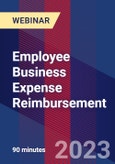Why Should You Attend:
Employers often provide travel advances, business expense reimbursement, or use of company property to employees. Employee expense reimbursement is one of the targets of a current IRS audit initiative. Unless expense reimbursements are made under an accountable plan, the payments must be included in employee wages. Accountable expense reimbursement plans provide tax savings for both employers and employees. But insufficient documentation or faulty procedures can result in reclassification of the reimbursements as wages. This results in additional tax and possibly penalties. An employer may even become liable for taxes it failed to withhold from the employee reimbursement.This webinar will cover the tax compliance for employee business expense reimbursements under both accountable and non-accountable employee business expense plans.
While the Tax Cuts and Jobs Act (TCJA) did not change the treatment of employee business expenses reimbursed under an accountable plan, employee expenses that are not reimbursed under an accountable plan may no longer be deducted by the employee.
Agenda
- Employee business expenses and reimbursements under the Internal Revenue Code.
- Accountable and non-accountable expense reimbursement plans.
- Substantiation and documentation required to exclude reimbursement or benefits from wages
- Options for meeting substantiation requirements
- Advantages and effective use of per diem payments
- Work from home expense reimbursement
- How to control the risk of a “pattern of abuse” of per diem payments
- Valuation and treatment of personal use of company property (vehicles, cell phones, etc.)
- When expense reimbursements or use of company resources must be included in wages.
- Travel advance and payment card administration
- The importance of timely processing of reimbursements and collection of excess advance funds.
- Control and accounting procedures and the roles of payroll and accounts payable








